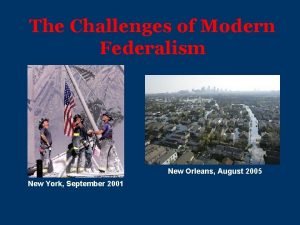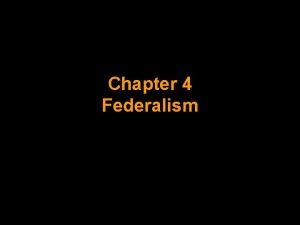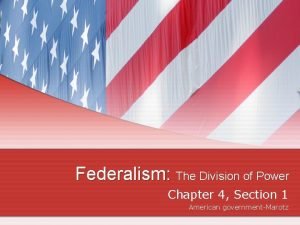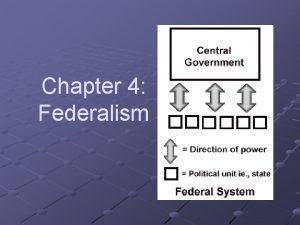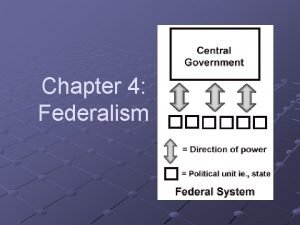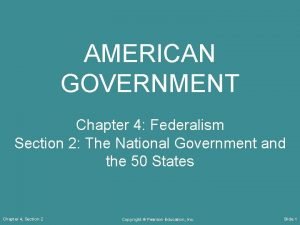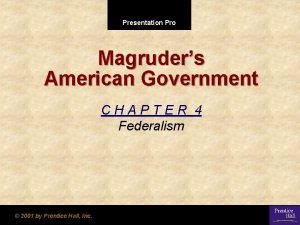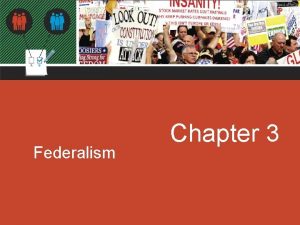Chapter 3 FEDERALISM AND AMERICAN POLITICAL DEVELOPMENT Political








- Slides: 8

Chapter 3 FEDERALISM AND AMERICAN POLITICAL DEVELOPMENT Political Theory Focus: The Roots of American Federalism; Federalist #s 17, 39, 46, and 51. © 2011 Taylor & Francis

Introduction • Federalism important for Founders because of their experience under British rule. • American Revolutionaries were opposed to monarchy. • Colonists believed in the limited government notion of republicanism’s virtue of self-rule. • They devised a system of government in which the states and a national government shared powers. • Founders sought a system that was effective, stable, and responsible to the citizenry. © 2011 Taylor & Francis

The Fear of a Tyrannical National Government • During the ratification debates, Federalists tried to quell the fears of the anti-Federalists that the Constitution would usurp state sovereignty. • The Federalists believed that the reverence for state governance and the rule of law could be maintained in a federal government. © 2011 Taylor & Francis

James Madison • Madison views federalism as providing greater security against tyranny. • In Federalist 51, Madison claims that, “Federalism and separation of powers work together to limit the power of government. ” © 2011 Taylor & Francis

Alexander Hamilton • In Federalist #17, Hamilton recognizes that proponents of sovereign state governments should not fear the encroachment of the national government: • Local rule will not be interfered with by the national government due to differing constituent concerns • Most politics will remain local • State and local governments retain their historic roles regarding the promotion of civil rule and society. © 2011 Taylor & Francis

Federalism and Republicanism • Federalist #39, Madison (Publius) • Ratification is through the people based on popular sovereignty and the “mixed character“ of the processes for ratifying and amending the document. • The above makes the process a Republican one. © 2011 Taylor & Francis

The People’s Preference for State Governments • Federalist #46, • The federal government has a limited scope of authority. • The states have the power through their populace to reject the machinations of any future federal tyranny. © 2011 Taylor & Francis

The People’s Preference for State Governments • Popular sovereignty checks any potential for excessive federal empowerment. • The continued existence and self-empowerment of state and local governments provides additional security against the encroachment of the federal government in state and local matters. © 2011 Taylor & Francis
 Dual federalism political cartoon
Dual federalism political cartoon Chapter 4 section 1 federalism powers divided
Chapter 4 section 1 federalism powers divided Chapter 4 section 1 federalism the division of power
Chapter 4 section 1 federalism the division of power Chapter 4 federalism the division of power
Chapter 4 federalism the division of power Chapter 4 federalism
Chapter 4 federalism Chapter 4 federalism
Chapter 4 federalism Chapter 4 federalism answer key
Chapter 4 federalism answer key Chapter 4 federalism
Chapter 4 federalism Difference between regionalism and federalism in a sentence
Difference between regionalism and federalism in a sentence
